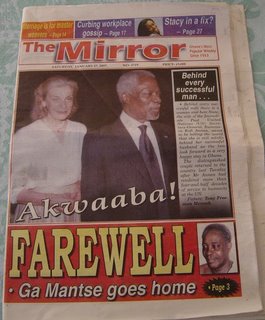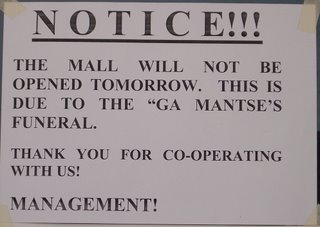Ga Mantse Goes Home

Saturday was the funeral for the late Ga tribal chief- Ga Mantse, Nii Amugi II, for this region of Ghana (which includes Accra).

Tribal Chiefs in Ghana are still very much a part of everything important that goes on in the country- it would take the rest of my life to start understanding much of what they do and represent for the people of Ghana, but I do know they are hugely misunderstood by governments outside Africa.
They are not allowed to be 'political', meaning they do not participate in the elected Government of Ghana, but they are very important in their localities, given much respect, and are the arbiters of local issues and disputes in the ten regions of Ghana.
If you are lucky enough to meet a Chief, you must be introduced and then basically do whatever you are asked to do which may include shots of an unbelievably potent liquor and participation in a tribal ritual. It's steeped in cultural tradition and easy for an outsider to screw up, but Ghanaians are forgiving. Especially if you are visibly snockered on 150 proof Palm wine.
Anyway, Ga Mantse died almost two years ago, but tribal chiefs are not buried until their succession is settled. This is a phenomenon we have encountered quite a few times since we moved here. Delayed funerals are not uncommon. We have no idea where the deceased hangs out while he waits and there is no polite way to ask.
When Ghanaians die, they 'go home', which reminds us of Mississippi funerals (and is surely a historical connection between blacks here and in the U.S.) where the family celebrates a 'homegoing' for their loved one.
So Ga Mantse finally got to go home, and the region literally shut down.
Remember, we live in the capital city, and it was still shut tight. The big Lebanese-owned groceries all the way down to the humblest plywood box thread seller were all closed and shuttered. There was almost no traffic on the streets and all funerals except this one were forbidden- even the hospital mortuaries were instructed to retain their bodies until after the funeral.

We didn't want to be disrespectful, but the prospect of an empty Accra was too tempting, so we went out exploring and found a ghost town. The main cemetery outside the Parliament grounds is usually bustling on a Saturday but there wasn't a single living soul in sight. Markets and traffic circles that are usually choked with people were simply empty. No taxis, no tro-tros, no people, no one trying to sell plantain chips and water to us at stop lights. Just a few cars (thankfully some of them containing Africans and not just rude Obronis), and an eerie quiet.
The funeral itself was in Teshie which is on the beach just the other side of La, and we stayed a respectful distance from that area to make sure we didn't commit any gross errors of cultural protocol.
This was one instance of local tradition that, while interesting, is too deeply ingrained in Ghanaian life for us to participate in. We could only wait and wonder and try not to be in the way.








<< Home